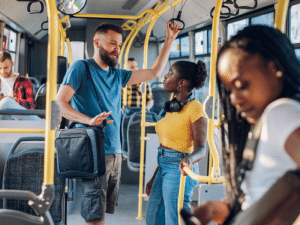Managing transport costs can be challenging for many South Africans, as public transport often forms a significant part of the monthly budget. Whether you’re a regular commuter or looking to reduce daily travel expenses, there are strategies to help achieve financial goals. This post explores practical ways to cut down on travel costs in South Africa.
Efficient and affordable public transport is crucial in both urban and rural areas. High transportation costs can strain personal budgets, so adopting smart travel habits and making informed decisions is essential. By being aware of available options and choosing wisely, residents can effectively manage transport expenses without sacrificing convenience.
Understanding your transport options

South Africa offers various transport options, such as buses, trains, taxis, and private services. A monthly train ticket is usually cheaper than daily fares, and buses often offer passes that fit different needs. Exploring all available options in your area can help you budget effectively and avoid unnecessary expenses.
Emerging services like ride-sharing apps and bike-sharing programs are also cost-effective, especially for short trips. Ride-sharing apps provide fare estimates, making it easier to compare prices. Carpooling can also reduce fuel costs and save time by using carpool lanes.
Familiarizing yourself with transport schedules and pricing can help you plan ahead and avoid costly decisions. Apps that track timetables and predict optimal travel times can further save money and time.
Leveraging discounts and loyalty programs
Many South African public transit systems offer discounts and loyalty schemes that can help reduce travel costs. Monthly or weekly passes are often much cheaper than buying daily tickets. Some areas also have loyalty programs where frequent travelers earn points redeemable for future rides. Off-peak discounts and seasonal promotions can be especially useful for those with flexible schedules. Transit apps can help you stay informed about these offers.
Students and educators often qualify for discounted or free travel, so it’s worth checking eligibility. Some corporate programs also offer subsidies or travel allowances, which can further cut costs. Keep an eye out for special deals during high-demand periods or events to benefit from temporary fare reductions.
To maximize savings, track your travel habits and align them with available discounts or loyalty programs. Over time, even small savings can add up, offering significant relief for anyone managing a tight transport budget.
Utilizing alternative commuting methods
Alternative commuting methods can offer significant savings beyond traditional public transit. Cycling is a cost-effective option for short to mid-range distances, with many South African cities becoming more bike-friendly. Although there is an initial cost for a bicycle, it can drastically reduce daily transport expenses. Walking, when feasible, is another free and healthy alternative.
Remote work can eliminate commuting entirely, saving both time and money. Even part-time telecommuting can reduce transport costs, while staggered work hours can help avoid peak transit times, reducing both expenses and stress.
Governments and environmental groups may offer incentives for green commuting options, such as subsidies for public transport or bike grants. These alternatives not only save money but also lower your environmental footprint, making sustainable commuting a win-win.
Effective budget planning for travel
Creating a travel budget is key to managing transportation costs. Track monthly expenses using apps or spreadsheets to identify savings. Consider unexpected costs like fare increases or emergencies.
Align transport costs with financial goals by setting aside funds for travel. Automating savings can help with financial discipline. Regularly adjust your budget to reflect changes in prices or needs. Carpooling or sharing passes with others can further stretch your budget, encouraging smarter spending over time.
Innovative travel tools and apps
Use modern technology to simplify both travel planning and budgeting. Apps offering real-time transit updates can help you find the fastest routes and avoid delays, while fare comparison tools ensure you select the most affordable options. Syncing these apps with budgeting tools helps you track and manage travel expenses, particularly useful for those new to public transport or unfamiliar with the area.
Engage with online communities or forums focused on local transit to gain insights from others. These platforms share personal tips and tricks for saving money on transport, providing valuable advice for navigating South Africa’s transport systems affordably.
Stay informed about tech advancements, like smart cards, which offer cashless, seamless travel. These innovations often come with discounts and automatic recharges, making travel more convenient and budget-friendly.
Flexible scheduling and off-peak advantages
Adjusting your travel schedule is a simple yet effective way to reduce transportation costs. Many transit systems offer lower fares during off-peak hours, saving money while avoiding crowded commutes. Experimenting with different routes or times can reveal more affordable options.
For those with flexible work hours, aligning your schedule with off-peak times can reduce stress and boost productivity. Planning personal tasks around these hours further optimizes time and expenses.
Flexibility is crucial for cost savings. Small adjustments, like negotiating work hours or planning personal errands strategically, can significantly impact both your budget and overall travel experience.



